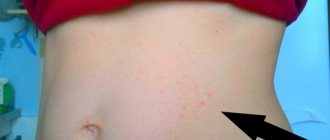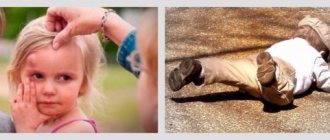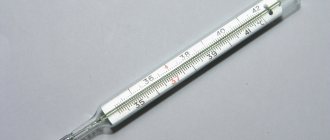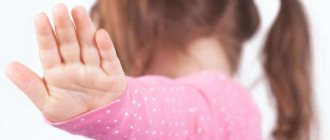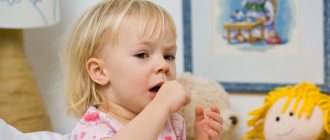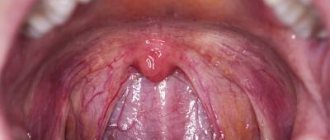What is a cough
Cough is a reflex release of the bronchi from dust, mucus, and foreign particles. It performs a healing function, rids the bronchi of pathogenic bacteria. This is not always a sign of a cold, viral or chronic disease.
For example, a cough also appears in a healthy child while crying. The reason is that the baby's nasopharynx becomes clogged with mucous secretions.
Excess tears enter the nasopharynx. Congestion from the nose flows down the back of the throat, stimulating the cough reflex. Similar symptoms appear in children aged three to seven years.
Learn about ways to treat coughs due to sinusitis.
Sometimes, while crying, the child begins not only to cough, but also to vomit.
Vomiting occurs during crying for the same reasons as coughing. The nasal ducts are freed from excess fluid, but tears and mucus do not come out through sneezing, but slide down the back wall of the nasopharynx, irritate the soft palate and cause vomiting after coughing.
Carefully! If a child vomits while crying, tilt him face down, otherwise the baby will choke. Wait until the vomiting stops, wash the child with cool water, and give him something to drink. This will stop the sobbing and eliminate stomach cramps.
Reasons for the development of night cough in children during sleep
Night coughs in children can be triggered by pathogens, allergens, worms, and sometimes the parents themselves are to blame for the attacks.
The main causes of cough in a child's sleep:
- viral, bacterial, fungal infections, parasites;
- allergy;
- whooping cough can also occur after vaccination against this disease;
- gastro-food reflux;
- foreign body inhalation;
- heart pathologies;
- passive smoking, negative environmental factors;
- dry, dirty, very hot or cold air in the room;
- nervous overstrain against the background of parental litter, resentment, stress.
In asthma at the initial stage of development of the disease, coughing attacks occur only at night or immediately after waking up, while a characteristic whistling sound is heard when inhaling. The appearance of unpleasant symptoms during sleep is caused by complete relaxation of the lungs; in this state, they are more susceptible to external and internal stimuli.
Children with cerebral palsy have a weakened immune system, suffer from physical inactivity, problems with the digestive system, all this often provokes the development of a special type of pneumonia in them, which is accompanied by attacks of night cough.
It is important to know! From a psychosomatic point of view, cough occurs in children in authoritarian families, in children who suffer from a lack of parental attention and love.
Respiratory diseases
If a child starts coughing in his sleep, the cause is most often flu or colds. The immune system in children is imperfect and therefore susceptible to attacks by viruses and bacteria.
Coughing at night occurs due to nasal congestion - the child breathes through the mouth, snot flows into the larynx, irritates the mucous membrane, which causes a slight cough or a severe coughing attack.
Allergy
Allergic cough most often has a seasonal nature, occurring during the flowering time of certain plants, but hay fever is characterized by daytime attacks.
If the child coughs only at night, the allergen is definitely in the room. This includes furniture, bedding, pajamas, toys, pillows; an attack can also be caused by washing powder used to wash children's clothes, or a new bathing product.
Reasons and ways to deal with the problem
First of all, find out if there are any signs of an emerging disease: respiratory viral infections, colds. Pay attention to how your baby is feeling at night. The onset of the disease is signaled by a night cough. If it is not present at night, it means that the baby does not have an infectious or cold disease.
Attention! If a cough occurs at night, consult your child’s pediatrician. Quick diagnosis of the disease facilitates further treatment.
First of all, find out the reason for crying and try not to create conditions for the emergence of negative emotions, and also follow the recommendations:
- When crying and vomiting, the water-salt balance is disturbed. Give your child clean water to drink in small quantities. You can add five drops of chamomile or anise infusion to the water. The drink has a calming effect and eliminates the effects of coughing and vomiting.
- Conduct classes with your child on hardening the soft palate . To do this, apply gentle pressure on it every day with a soft toothbrush or spoon. This training will reduce the sensitivity of the palate, and there will be less gagging when coughing.
- Use your child's mouth rinse . This simple procedure to carry out at home will prevent unwanted nasopharyngeal reflexes.
- Daily rinses can be done with weak solutions acidified with lemon juice. Acidic solutions will relieve excessive dry mouth, which also causes coughing while crying.
- The reason for crying followed by coughing and vomiting often lies in the stress that the child experiences when parents quarrel, for example, or from lack of attention. Excessive attention from parents also leads to undesirable consequences - the whims of the baby. Maintain smooth, friendly relationships in the family.
- Harden the baby's nervous system: warm baths at night with sea salt solutions, morning rubdowns with cold water will have a beneficial effect.
- Exercising the muscles of a child's tummy also helps to get rid of gagging when coughing.
If you see that the child is gagging and continues to cry and cough, ask him to clench his left fist. This will stop the vomiting. Then distract the baby’s attention, offer to play or take a walk.
Find out how to get rid of purulent sputum when you cough.
Causes and treatment of cough in a child during sleep
Coughing in a child during sleep is a fairly common occurrence. The cough itself is not a disease, but a reaction to a disease or an allergic reaction to external irritants. This is a defense mechanism by which the body gets rid of harmful microorganisms. A cough in a child's sleep is a serious signal for examination.
Causes of night cough
Among the main causes of cough are:
- Viral infection.
- Chronic rhinitis and sinusitis.
- Chronic pharyngitis.
- Incipient asthma.
In addition, coughing in a child’s sleep may be a consequence of whooping cough. Cough while lying down worsens in children suffering from gastroesophageal reflux or inflammation of the adenoids. The mucus enters the larynx and, drying out when breathing through the mouth, causes a reflex cough. Attacks at night may be a consequence of intolerance by the child’s body to certain materials, such as:
- bed linen fabrics;
- washing powder;
- low-quality types of rubber and plastic from which the objects next to the bed are made, as well as fresh paint on them.
An allergic cough can be caused by animal hair, dry air, or the presence of dust.
Allergy symptoms include increased sweating, tearing, slight swelling in the eyes and cheeks, and runny nose. Sputum production during night cough and frequent attacks can be a signal of a viral infection. Teething saliva in babies can get into the throat while they sleep, irritating it and causing a nighttime cough.
If your child coughs before bed, it is most likely an allergy. If after, the dry air in the room or an uncomfortable position during sleep due to illness is to blame.
If the cough comes on during the day and gets worse when the child is sleeping, this may be a sign of laryngitis, a serious disease that, without proper treatment, can lead to suffocation (croup).
Coughing while lying down may be a sign of the onset of a whole group of pulmonary diseases that do not manifest themselves in any way during the daytime.
The supine position makes it difficult not only to cough, but also to the blood supply to the lungs, and reduces the efficiency of resorption of sputum and mucus accumulated in the bronchi.
A sudden cough in a child at night can be caused by a foreign body entering the nasopharynx.
Treatment of night cough in a child
The first thing to do when you have a night cough is to determine its cause.
Remember that treatment without specialist supervision can lead to serious consequences. When cough is suppressed, the body's protective functions are inhibited, and the disease worsens. Finding no way out, phlegm and mucus accumulate and fall into the lungs, contributing to the development of pneumonia. Only a doctor can determine the exact reason why a child coughs before or during sleep and prescribe appropriate treatment. However, you can eliminate everyday causes of cough yourself. If the child is absolutely healthy during the day, is active, eats with appetite, but coughs at night, you should observe the nature, frequency and strength of night attacks. A dry, scratchy or tingling cough in the throat may indicate an ENT disease. In bronchial asthma, cough appears closer to the morning and is characterized by a slight whistling sound when exhaling.
Attacks after sleep and at night may indicate reflux of the gastrointestinal tract, that is, the backflow of stomach contents. In this case, an increased content of hydrochloric acid is manifested by heartburn.
Whooping cough is characterized by painful bouts of coughing with redness of the face, watery eyes, which end in vomiting. A dry cough alternating with a wet cough may indicate a viral infection.
If the cause of attacks exclusively at night is not viruses or allergens, it is necessary to humidify the air, since the baby’s unformed lungs react painfully to dry air space. To do this, it is necessary to carry out wet cleaning in the nursery at least three to four times a day.
Stale air can cause attacks after sleep; in this case, airing the room before bed will eliminate the cough. If you suspect an allergic cough of a domestic nature, it is necessary to remove from the child’s environment things and objects that cause this cough. However, if this measure does not help, you need to contact a specialist.
Drug therapy involves two types of drugs. The first are mucolytics, which increase sputum and intensify cough with expectoration. The second type is used for whooping cough with its severe, prolonged attacks. It should be taken into account that children under two years of age are not recommended to take medications. It is not recommended to put mustard plasters or warming compresses on your child until he is six months old. In the future, these products are recommended to be used with caution, given the strong sensitivity of children's skin. Walking in the fresh air, rinsing the nose, drinking plenty of fluids, and moist fresh air during night sleep will have a positive effect on the baby’s health.
For older children, inhalations with decoctions of medicinal herbs are effective. Inhalations are prohibited for children under one year of age. The main thing in treatment is rest and proper nutrition with plenty of fluids.
Treatment with folk remedies
Folk remedies for the treatment of night cough should be used with caution and only after consultation with a doctor. The child's body, especially at an early age, does not have the proper endurance. The most beloved by children and the easiest to prepare is a remedy made from burnt sugar diluted with boiling water. For whooping cough, a mixture of garlic with melted pork fat for compresses or a tincture of garlic with milk for drinking is effective.
Severe, lingering coughs are treated with a warm compress made from a mixture of garlic and honey. Decoctions of medicinal herbs, which are drunk instead of tea and used for inhalation, are useful. At home, it is recommended to treat an acute cough, but not a protracted or dry cough that requires specialist supervision.
In any case, it is necessary not to eliminate the cough, but to look for ways to alleviate it and eliminate the root cause.
lor03.ru>
When she cries, she starts coughing a lot
Dear mothers, when my child cries, he starts coughing a lot, why does this happen? Has anyone had this happen? The question was asked by Khava Dokaeva
You may also like.
Please tell me who had this situation and how it all ended We are 11
by Adminrive · Published 06/03/2014
My baby is 2 months old
by Adminrive · Published 03/24/2014
English lessons for little ones
by Adminrive · Published 02/14/2014
I just watched the program yesterday, maybe it’s whooping cough... It’s worth seeing a doctor..
We still start vomiting, so we need to see a neurologist..
or maybe he just choked on his saliva...
It may also just be choking on saliva, or your throat will become very dry. This still happens to me when I burst into tears. Don't panic, most importantly!
Me too, but not always. He cries, starts coughing and immediately calms down.
Damn, what does whooping cough have to do with it? the child might just be choking on drool and snot
Go to a neurologist!
My sister starts having a crazy cough when she cries, we were told this was due to nervousness, although she is 20 years old.
The child’s mouth may simply be dry from crying. That’s why he’s coughing. I don’t think it’s worth visiting the hospital. Well, as a mother, it’s up to you to decide.
Semi-Lee, I’m also only 29.)
The same thing happened to us, (even to the point of vomiting) it happens due to nervousness - consult a neurologist!
We also had this happen when our son was little, the roaring turned into coughing and even shortness of breath. This went away with age, I started crying when I grew up and not crying))) But still see a neurologist, it won’t get any worse.
How old is the baby? It might be drooling, but since they don’t know how to swallow small packs and don’t control swallowing, then most likely it’s drooling... Don’t listen to anyone about whooping cough, ask your doctor better, so as not to worry
If when he gets really hysterical and yells, he forgets to take a breath of air and then clears his throat... don’t worry, mine does exactly the same thing
depending on what “coughing a lot” means to you, mine, when crying, coughs five or six times... dry, that is, either the throat is dry or there is not enough air... but I think that there is nothing like that... it’s another matter, if a child is hysterical and starts coughing so much that he cannot stop, then of course you need to see a doctor...
There may be enlarged tonsils, check. Now every second child has this since birth. This may be the cause of the cough.
This happens to us due to a large amount of saliva.
My eldest daughter (she’s almost 3 years old) has about the same situation, she started coughing when she cried, when she went outside or when she ran. I, like many, thought that this was the norm, that she simply had something in her mouth, until I came across some article that said that such a cough could be a sign of either incipient asthma or allergies. I consulted with our pediatrician and she confirmed this information. We took a nasal swab and our allergy was confirmed. Now we spray Nasonex in the nose and the cough has noticeably decreased. Contact your local pediatrician first.
Cough during sleep in a child
Cough is a common companion to many diseases, which brings a lot of inconvenience. Very often, the peak of coughing activity occurs at night and then it is not sweet for both the kids and their parents.
What is a cough and why is it needed?
Coughing helps remove mucus and other bodies that have entered the respiratory tract. During coughing attacks, the respiratory muscles sharply contract and air is expelled from the lungs. It follows that we need it, because... serves to cleanse the respiratory tract.
Causes of cough during sleep
The main reason why a child develops a cough during sleep is the position in which we find ourselves at night. Lying down slows down the basic processes of the body, even the blood supply to the lungs. Mucus and phlegm accumulate in the pharynx and bronchial area, which take longer to dissolve at night, which is why the child coughs in his sleep. Try using large pillows during illness and try to change the position of the child’s body more often, so phlegm will accumulate less.
By the way, it is worth considering that the appearance of mucus and phlegm is promoted by some disease that needs to be cured, and after that the cough will go away. Why a child coughs in his sleep should be determined by a doctor. Sometimes a strong persistent cough in a child in a dream indicates the presence of a serious illness.
Child's cough after sleep
There is no need to panic because of a mild morning cough accompanied by profuse drooling in a child of the first year of life. Thanks to this, the trachea and bronchi are cleared of mucus accumulated overnight. If the cough begins to occur constantly, then you need to sound the alarm and definitely see a doctor.
Child coughs before bedtime
The most common cause of coughing before bed is allergies. It can appear both on down from a pillow and on synthetic fillers, which are actively used in bedding these days. In order to identify the allergic cause of the cough, try changing the child’s entire bed and wait a few days. If the cough does not go away, then it makes sense to visit a pediatrician.
Dry cough during sleep
Most often, a dry night cough occurs every 3-4 hours for 5-7 minutes. The causes of this cough are colds, asthma, whooping cough and other lung diseases. In order to get rid of a dry cough, you need to understand the cause of its occurrence, and for this you need the help of specialists. But you can help your child alleviate the condition on your own; mind you, alleviate it, not cure it! To do this, use recipes from traditional medicine.
If your child does not have allergies, you can prepare:
- oregano decoction;
- green tea with honey or ginger;
- tea with anise;
- warm milk with honey.
All these liquids should be consumed before bed; they help soothe a sore throat and reduce the frequency of coughing attacks.
Cough in a baby's sleep
As mentioned above, a cough may appear due to accumulated mucus. But, if for large children the range of acceptable drugs is wide, then with small children everything is more complicated. To ease coughing attacks in your baby, use a drainage massage,
it will help the phlegm come out. The basis of this massage consists of intensive tapping of the back, in the direction from the butt to the head. And remember that babies under 6 months should not have their breasts rubbed or use steam inhalations.
To combat a cough, you must remember to ventilate the room, humidify the air and get rid of dust, which can cause coughing attacks. After eradicating the cause of its appearance, it will be appropriate to start hardening the child. This way, in the future you will protect your miracle from many diseases. And of course, do everything to ensure that there is never any tobacco smoke near your baby!
WomanAdvice.ru>
Why does my baby cough?
Coughing is a normal, protective reaction of the body.
Until the age of two months, the child coughs because his respiratory system adapts to the new environment. The baby’s behavior does not change, he eats actively and sleeps enough. Over time, such coughing disappears.
Baby teething as a test of endurance
The appearance of denticles is a painful process. The baby reacts to it with an increase in temperature, sleep disturbances, refusal to eat, and secretion of a large amount of saliva, which he coughs out (wet cough) or spits.
This phenomenon can be mistakenly mistaken for ARVI. But swollen and reddened gums in the beginnings of baby teeth inform frightened parents that the child is growing up.
Otitis media inflammation of the middle ear. The cough is associated with irritation of the nerve, which innervates the oropharynx and ear cavity with its branches. Therefore, the impulse reflexively passes from the damaged organ to the healthy one, and symptoms of both otitis and pharyngitis (inflammation of the pharynx) appear.
Low air humidity
Parents try to create a warm, cozy environment for their child, even in the summer, and can overdo it. The child is bothered by a dry, hacking cough. And all because of the too dry indoor climate. Dry air irritates the mucous membrane of the back of the throat.
Advice! Parents, remember that maintaining sufficient air humidity is necessary for both adults and children. After all, water is life. And it is also needed for the functioning of the respiratory system. Be careful!
Contaminated air
Air has a detrimental effect on a small family member. Therefore, stop smoking at least around your child. If a baby coughs in a yard where there is industrial smoke or the result of burning autumn leaves, then it is better to choose a more suitable place for a walk.
Intrauterine infection - infection of the baby before birth
The child faces congenital pneumonia, which is difficult to treat. This happens when a mother suffers from infectious diseases during pregnancy and does not receive adequate treatment.
The baby is sneezing and coughing
Often these are symptoms of a common cold or ARVI. As a rule, the disease is accompanied by fever and copious mucous discharge from the nasal cavity. The same secretions provoke a wet cough when they fall on the back wall of the throat (the sensitive cough zone of the upper respiratory tract), and sneezing.
If the baby wheezes and coughs, this is an alarm for parents. These may be symptoms of acute laryngotracheitis or, as it is popularly called, false croup, which is accompanied by shortness of breath, a specific barking cough (see Barking cough in a child without fever: possible causes), noisy breathing and, if assistance is not provided in a timely manner, can end sadly.
In this case, it is also necessary to humidify the air. Hot steam from a working kettle or a bath with plenty of water (sauna effect), distraction therapy in the form of a back massage or patting the buttocks will help.
Congenital heart disease is accompanied by a dry, frequent cough, shortness of breath, paleness, and blue discoloration of the skin. The baby is restless, the intercostal spaces and fontanelles are intensely retracted when the baby cries.
Advice! Suspicion of a pathology of heart development is a reason to contact a pediatric cardiologist. It is also important to know that infants have a normal heart rate of 130-140 beats/min at rest, and, for comparison, adults have 60-90.
What to do if your baby coughs in the morning?
Morning is the time for the reign of the vagus. In other words, physiological activation of the vagus nerve, which causes the bronchi to narrow.
Shortness of breath combined with wheezing are symptoms of acute obstructive bronchitis or bronchial asthma. The latter ailment is hereditary, associated with allergies (see How to recognize an allergic cough in a child) and requires particularly careful examination and treatment. Children whose mothers are accustomed to smoking cigarettes are at risk for developing bronchitis.
How to help your child during a night attack
It can be very difficult to calm a child's dry cough at night. But you can alleviate the baby’s condition if you know how to act correctly in such a situation.
Here's how to help your child cough at night:
- Drink plenty of water during illness. This will increase the production of sputum and make it more liquid, which will facilitate its removal.
- Reduce the air temperature in the room.
- Increase air humidity.
- Give your child an antihistamine to help calm a child's allergy cough at night.
- Change your baby's position more often during sleep to prevent mucus from accumulating in the lungs.
- Reduce the number of allergens in the room, do not use essential oils and rubbing.
If a child’s severe cough at night lasts for several days in a row, be sure to consult a pediatrician to prevent serious complications.
source
Cough after feeding
Occurs for several reasons:
- Inappropriate position for breastfeeding
- A large amount of milk in the mother's breast
- Increased pressure inside the stomach.
Advice! To better regurgitate excess milk, the mother should lift the baby and gently press her to her, put a warm diaper on the tummy, in a word, relax the intestinal muscles. This way you can also stop an attack of intestinal colic, which is manifested by the child’s agitation when he cries after feeding due to bloating and gas not passing.
Treatment of cough in infants
You need to contact a specialist. A doctor who examines and treats newborns is a neonatologist. A pediatrician cares for babies older than one month.
Actions for a runny nose during ARVI
In this case, the baby’s nose should be washed with an antiseptic solution. The best option is drops. Then, using a rubber bulb, the contents of each nasal cavity are removed in turn.
Advice! During this unpleasant procedure, it is necessary to close the entrance to the baby’s ear with your finger to prevent mucus from entering the ear cavity behind the pressure gradient. In this way, you will prevent the development of otitis media.

